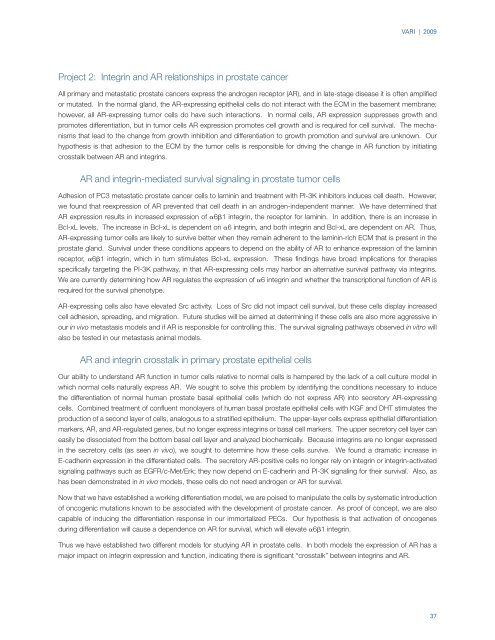2009 Scientific Report
Create successful ePaper yourself
Turn your PDF publications into a flip-book with our unique Google optimized e-Paper software.
VARI | <strong>2009</strong><br />
Project 2: Integrin and AR relationships in prostate cancer<br />
All primary and metastatic prostate cancers express the androgen receptor (AR), and in late-stage disease it is often amplified<br />
or mutated. In the normal gland, the AR-expressing epithelial cells do not interact with the ECM in the basement membrane;<br />
however, all AR-expressing tumor cells do have such interactions. In normal cells, AR expression suppresses growth and<br />
promotes differentiation, but in tumor cells AR expression promotes cell growth and is required for cell survival. The mechanisms<br />
that lead to the change from growth inhibition and differentiation to growth promotion and survival are unknown. Our<br />
hypothesis is that adhesion to the ECM by the tumor cells is responsible for driving the change in AR function by initiating<br />
crosstalk between AR and integrins.<br />
AR and integrin-mediated survival signaling in prostate tumor cells<br />
Adhesion of PC3 metastatic prostate cancer cells to laminin and treatment with PI-3K inhibitors induces cell death. However,<br />
we found that reexpression of AR prevented that cell death in an androgen-independent manner. We have determined that<br />
AR expression results in increased expression of a6b1 integrin, the receptor for laminin. In addition, there is an increase in<br />
Bcl-xL levels. The increase in Bcl-xL is dependent on a6 integrin, and both integrin and Bcl-xL are dependent on AR. Thus,<br />
AR-expressing tumor cells are likely to survive better when they remain adherent to the laminin-rich ECM that is present in the<br />
prostate gland. Survival under these conditions appears to depend on the ability of AR to enhance expression of the laminin<br />
receptor, a6b1 integrin, which in turn stimulates Bcl-xL expression. These findings have broad implications for therapies<br />
specifically targeting the PI-3K pathway, in that AR-expressing cells may harbor an alternative survival pathway via integrins.<br />
We are currently determining how AR regulates the expression of a6 integrin and whether the transcriptional function of AR is<br />
required for the survival phenotype.<br />
AR-expressing cells also have elevated Src activity. Loss of Src did not impact cell survival, but these cells display increased<br />
cell adhesion, spreading, and migration. Future studies will be aimed at determining if these cells are also more aggressive in<br />
our in vivo metastasis models and if AR is responsible for controlling this. The survival signaling pathways observed in vitro will<br />
also be tested in our metastasis animal models.<br />
AR and integrin crosstalk in primary prostate epithelial cells<br />
Our ability to understand AR function in tumor cells relative to normal cells is hampered by the lack of a cell culture model in<br />
which normal cells naturally express AR. We sought to solve this problem by identifying the conditions necessary to induce<br />
the differentiation of normal human prostate basal epithelial cells (which do not express AR) into secretory AR-expressing<br />
cells. Combined treatment of confluent monolayers of human basal prostate epithelial cells with KGF and DHT stimulates the<br />
production of a second layer of cells, analogous to a stratified epithelium. The upper-layer cells express epithelial differentiation<br />
markers, AR, and AR-regulated genes, but no longer express integrins or basal cell markers. The upper secretory cell layer can<br />
easily be dissociated from the bottom basal cell layer and analyzed biochemically. Because integrins are no longer expressed<br />
in the secretory cells (as seen in vivo), we sought to determine how these cells survive. We found a dramatic increase in<br />
E-cadherin expression in the differentiated cells. The secretory AR-positive cells no longer rely on integrin or integrin-activated<br />
signaling pathways such as EGFR/c-Met/Erk; they now depend on E-cadherin and PI-3K signaling for their survival. Also, as<br />
has been demonstrated in in vivo models, these cells do not need androgen or AR for survival.<br />
Now that we have established a working differentiation model, we are poised to manipulate the cells by systematic introduction<br />
of oncogenic mutations known to be associated with the development of prostate cancer. As proof of concept, we are also<br />
capable of inducing the differentiation response in our immortalized PECs. Our hypothesis is that activation of oncogenes<br />
during differentiation will cause a dependence on AR for survival, which will elevate a6b1 integrin.<br />
Thus we have established two different models for studying AR in prostate cells. In both models the expression of AR has a<br />
major impact on integrin expression and function, indicating there is significant “crosstalk” between integrins and AR.<br />
37

















